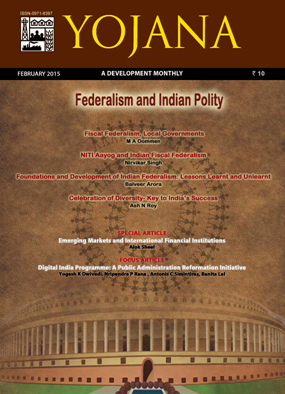 |
|
 |
COVER
STORY |
 |
|
| |
| |

|
|
Tapping Sustainable Energy Alternatives
|
|
|
The second lead article, which is also focus article, is written by Shri N Bhadran Nair. Citing a report of the World Health Organisation, the author has advocated for tapping sustainable energy alternatives
|

|

|

|

|
|
Financing Renewables in India
|
|
|
The third article is written by Shri P C Maithani, Adviser, Ministry of New and Renewable Energy. He has focussed on renewable energy resources
|

|

|

|
|
Steps to Achieve India’s Solar Potential
|
|
|
The special article is written by Sumant Sinha, Chairman and Managing Director of ReNew Power. He opines that India must also honour its global commitments on curbing greenhouse gas emissions
|

|

|
|
 |
Lead Article
Textiles the word brings up images of beautiful drapes cotton, silk, chiffon, lace. Whether it is the material draped on the figurine of the lady from Mohenjadaro, the stylish drapes of Cleopatra, the ball dance gowns of the Victorian Era or the lovely dresses worn by our own queens and princesse...
read more... |
|
 |
|
|
|
|
|
|
|
Exile of Buddha
|
|

Let us end with a story. Around 5th century BC, the republican states of Lichchavi and Sakya had an institutional system called Santhagara which was used to debate issues of vital importance to the republic, including disputes between various constituents of the republic. Buddha was initiated into the Sakya Santhagara at the age of 20. When he was 28, there was a dispute over sharing of water of Rohini River between the Sakyas and Koliyas. The Sakya military commander was in favour of war on Koliyas which Siddhartha opposed. But the peace proposal of Siddhartha was defeated miserably during voting. Siddhartha had to face exile. Buddha may have been defeated and exiled but the idea of the republic and settling of disputes without the use of force has survived. The republican spirit has survived as a guiding spirit for nations.
|
|
|
|
|
|
|
|
|
|
|
 |

|
|
 |
|
|
 |
|
Regular
Column |
 J&K Window : J&K Window : |
|
|
 Do you know? : What is Forensic Auditing Do you know? : What is Forensic Auditing |
|
Forensic auditing refers to the auditing with the main aim to employ accounting techniques and methods to gather evidence to investigate the crimes on financial front such as theft, fraud etc.
|
|
|
 |
|
 |
 |